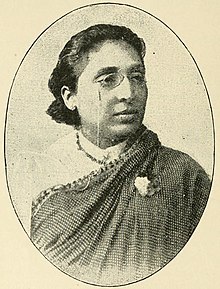Soonderbai Hannah Powar
Soonderbai Hannah Powar | |
|---|---|
 Soonderbai Powar, from a 1900 publication. | |
| Born | Soonderi Hannah Powar July 29, 1856 |
| Died | December 15, 1921 |
Soonderbai Hannah Powar (July 29, 1856 – December 15, 1921) was an Indian Christian philanthropist and anti-opium activist. She worked closely with Pandita Ramabai.
Early life
Soonderi Hannah Powar was born in 1856, the daughter of Christian converts[1] Ganderbai and Ramachandra Powar.[2]
Career
Powar lectured on the opium trade,[3] touring in Great Britain in 1888–1889 season, and again for the 1892–1893 season,[4] with the support of the Bombay Guardian newspaper and the Women's Anti-Opium Urgency League.[5] She wrote a 29-page pamphlet, An Indian Woman's Impeachment of the Opium Crime of the British Government: A Plea for Justice for Her Country People (1892), to accompany her second tour.[6]
Powar ran a teacher training school,[7] and worked closely with Pandita Ramabai at the Sharada Sadan (Abode of Wisdom),[8] a refuge and school for child widows, started in Bombay and later moved to Pune and still later to Kedgaon. She took full charge of Sharada Sadan when Ramabai left for the United States in 1898.[9] She wrote about the difficulties of Hindu girls and women in a book,[10][11] Hinduism and Womanhood: Personal Histories showing the Fruits of Hinduism, written and compiled for the information of British Christian Women, and in Christian missionary publications, including The Indian Alliance in 1907.[12]
After Powar's death in 1921, Kate Storrie wrote a biography, Soonderbai Powar: A Noble Worker for Indian Womanhood (1924), also published with the subtitle For 45 Years an Earnest Worker for God in India.[13]
References
- ^ Our Day: A Record and Review of Current Reform. Our Day Publishing Company. 1891. pp. 460–462.
- ^ Sen, Indrani (February 2014). "Writing English, Writing Reform: Two Indian Women's Novels of the 19th Century". Indian Journal of Gender Studies. 21 (1): 1–26. doi:10.1177/0971521513511198. ISSN 0971-5215. S2CID 145363195.
- ^ "Women of the Hour". The Fort Scott Weekly Tribune. 1892-05-19. p. 4. Retrieved 2020-10-04 – via Newspapers.com.
- ^ "Anti-Opium Demonstration". The British Friend. 1: 17. January 1, 1892.
- ^ Anagol, Padma (2017-03-02). The Emergence of Feminism in India, 1850-1920. Routledge. ISBN 978-1-351-89080-9.
- ^ Powar, Soonderbai Hannah (1892). An Indian Woman's Impeachment of the Opium Crime of the British Government: A Plea for Justice for Her Country People. Dyer.
- ^ Dyer, Helen S. (1907). Revival in India: "Years of the Right Hand of the Most High.". Morgan and Scott. pp. 49–50.
- ^ Guinness, Lucy Evangeline (1898). Across India at the Dawn of the 20th Century. Religious Tract Society. p. 91.
- ^ Dyer, Helen S. (1900). Pandita Ramabai: the story of her life. Robarts - University of Toronto. London Morgan and Scott. p. 68.
- ^ Anagol, Padma (2010-09-01). "Feminist Inheritances and Foremothers: the beginnings of feminism in modern India". Women's History Review. 19 (4): 523–546. doi:10.1080/09612025.2010.502398. ISSN 0961-2025. S2CID 144279774.
- ^ Midgley, Clare (1998-03-15). Gender and Imperialism. Manchester University Press. p. 87. ISBN 978-0-7190-4820-3.
- ^ Powar, Soonderbai (October 1907). "Hinduism" (PDF). The Indian Alliance. 7: 38.
- ^ Storrie, Kate (1924). Soonderbai Powar, for 45 Years an Earnest Worker for God in India. Pickering & Inglis.
